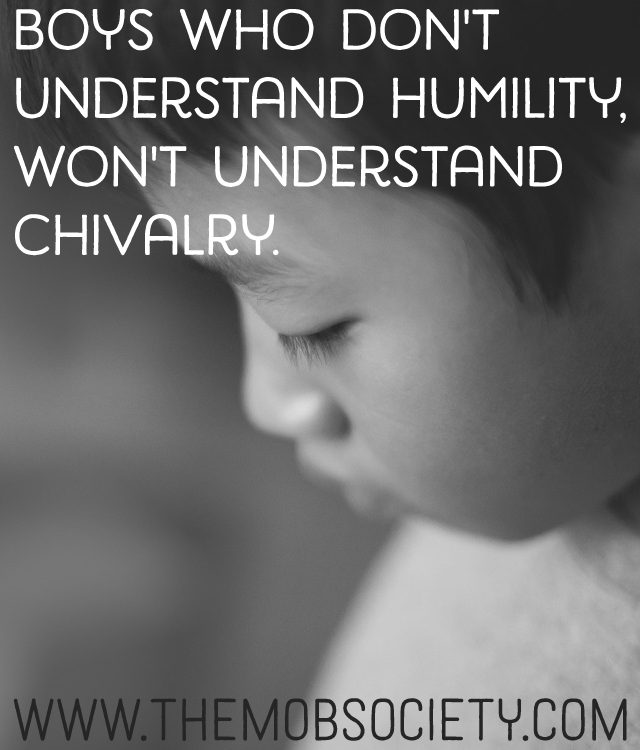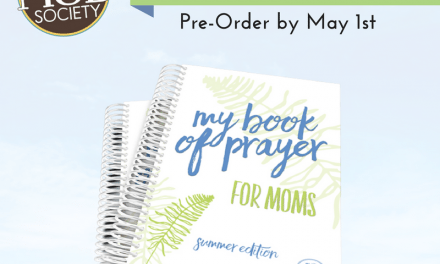“Time to turn off the iPad!” I called into the living room. No response.
“Bradley, time’s up. Please, come here to help with dinner.”
Silence. I walked into the living room.
“Bradley, did you hear me?”
“But, Mom! I really want to play. Besides, I don’t want any dinner!”

The Heart of the Matter: Humility via The MOB Society
My son knows we have specific limits on media time, and his time was up. He also knows he should come when called. As the oldest child, it is important he help out at dinnertime to set an example. None of this was out of the ordinary or unusual, but at that moment his desire for entertainment was pushing all of that aside. Instead of taking on the attitude of a servant, he was being selfish—not to mention disrespectful.
I want to train my son to respect women. If my sons don’t show honor and respect to me, I know they sure won’t respect their future wives and other women in their life. Boys who don’t understand humility, won’t understand chivalry.
What Does it Mean to be Humble?
Humility is thinking less about your desires and more about the interests of others. It’s about remembering that we’re God’s creatures, not the center of the world. We are here to serve God and others, not ourselves. This is a lesson I want to ingrain in my children’s minds—and my mind as well.
The ultimate example of humility is studying the incarnation and death of Jesus Christ. Jesus demonstrated humility perfectly in his life and in his death. He loved, served, respected, and cherished others perfectly.
Using the Word of God to Train our Boys
The word of God is powerful. It has the power to transform our lives and the lives of our children. We have found Philippians 2:1-18 to be the perfect passage to teach this lesson to our children.
In this beautiful text, Paul gives the Philippians no less than a dozen motivations for pursuing a life of humility. He also composes one of the most concise and memorable poems about Christ as the ultimate example of humility, highlighting His incarnation, service-centered life, and death.
Using Philippians as a Template for Humility
• Study Philippians 2:1-18 slowly as a family.
Look at all the phrases in v.1. Note the four motivations for humility packed in this single verse. Take a day to talk about each one.
Study the poem/hymn in v.5-11 and talk about specific phrases. Take a day to discuss each phrase between the periods and commas. Slowly unravel the story of the gospel for your kids.
Look at the benefits of humility mentioned in v.12-16. Take time to pause on each thought and talk about it.
• Talk about how this text shapes the way we treat others.
How does humility help us to be united to others (v.2)?
How does an attitude of humility impact the way I see others and their desires (v.3-4)?
What are some of the attitudes that are the opposite of humility mentioned in this text (v.3, 14)?
What are very practical ways we can follow Jesus’ example and take the form of a servant (v.7)?
• Memorize Philippians 2:1-18
I can not overestimate the importance of Scripture memorization enough. When we memorize the words of the Bible, it becomes part of us. We can draw upon these words over and over again, especially in times of trouble or temptation. Begin to train your child to memorize scripture while they are young.
• Throughout the day, prompt your child to answer the questions as situations arise:
How can I serve others today?
Do my actions remind me of Christ’s selfless service?
What is the major obstacle in my life to humility? (hint: selfishness)
• Pray
Pray that the Lord will make these lessons real in your life and in the life of your child.
More Resources
- The Heart of Humility: Teaching Kids to Put Others First – A study of Philippians 2:1-18 that’s perfect for families.
- Write Through the Bible (Philippians 2:1-18) – A workbook that integrates handwriting, vocabulary and scripture memory.
- Memory Box (free printables to make your own).We use this memory box to aid in Bible memory—it’s great for other subjects too.







